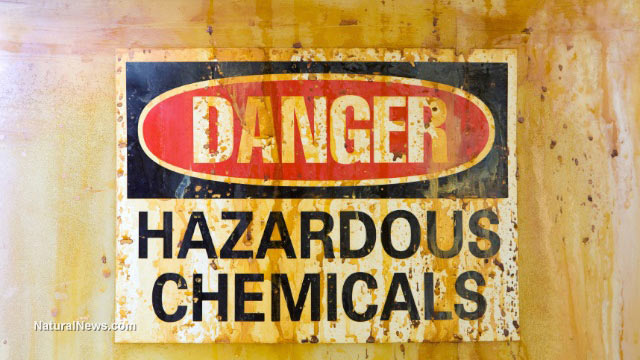Pesticide manufacturers, EPA don't have to list most hazardous ingredients on pesticide labels, judge decides
Friday, March 11, 2016 by: Julie Wilson staff writer
Tags: pesticide labels, hazardous ingredients, chemical industry

(NaturalNews) The U.S. Environmental Protection Agency (EPA) has repeatedly denied a petition filed by environmental groups asking for better pesticide labeling. In March, Beyond Pesticides, the Center for Environmental Health, Physicians for Social Responsibility and other advocacy groups sued the EPA for failing to act on the petitions that were filed more than eight years ago.
The 2006 petition[PDF] requested that the EPA require the labeling of 374 inert chemicals on pesticide bottles that were considered hazardous under other EPA environmental laws. Pesticides manufacturers are only required to label active ingredients, despite the fact that some so-called inert ingredients are far more toxic than active ones.
Take for example polyethoxylated tallowamine (POEA), an inert ingredient in Monsanto's Roundup that, when mixed with glyphosate, amplifies the toxic effect on human cells. A 2009 study published by the American Chemical Society concluded that POEA can kill human cells within 24 hours, especially embryonic, placental and umbilical cord cells.
POEA was found to be more deadly than glyphosate.
EPA's policy allows chemical companies to hide perilous ingredients from consumers
Despite this research, the EPA denied the petition, and a California federal judge threw out the case in September. U.S. District Judge William H. Orrick ruled that the EPA had already complied with the plaintiff's terms when they agreed to remove 72 inert ingredients from their list of approved ingredients.
Although a step in the right direction, the EPA's proposal is inadequate in many regards, including the fact that there are still more than 300 other potentially harmful inert ingredients still approved for use. And the chemicals targeted by the EPA's proposal aren't even being used as inert ingredients anymore, such as rotenone, turpentine oil and nitrous oxide, according to eNews Park Forest.
Instead of rulemaking, a process that the EPA says will be a "long, complex and resource-intensive activity," the agency says it's developed an "alternative strategy" that will reduce the risks linked to hazardous inert ingredients.
EPA says they can't commit to rulemaking on labeling toxic inert ingredients on pesticide products
The EPA "will review inert ingredients currently listed for use in pesticides, update that list, establish criteria for prioritization, and select top candidate inert ingredients for further analysis and potential action."
Green groups voiced disappointment with the outcome after waiting three years for an answer. "The agency had really been looking at good changes for progress on the issue and has now just backed off," said Carolyn Cox with the Center for Environmental Health.
The EPA said they could not legally commit to any "particular outcome for rulemaking," reported Courthouse News Service.
U.S District Judge Orrick wrote:
That the EPA has indicated that it is considering (but not committing to) action which arguably parallels part of what the plaintiffs requested in their original petition does not mean that the EPA has retroactively granted the portion of the plaintiffs' petition that the EPA denied in 2009.
Plaintiffs are understandably frustrated that they may be no closer to fulfilling their goal eight years after petitioning the EPA to require that pesticide product labels list hazardous inert ingredients. But the EPA has unambiguously 'concluded' the 'matters' presented to it in plaintiffs' petitions, as required under the Administrative Procedures act, 5 U.S.C. §553(e), and I can offer the plaintiffs no relief. This matter is moot, a deficiency which cannot be cured by amendment.
Environmental advocates say knowing what type of chemicals we are exposed to is important, and doctors having that information can save lives and provide better treatment to victims of pesticide poisoning.
"Because pesticides are something we are all exposed to every day, there are a lot of compelling reasons to know the ingredients," pressed Cox. "This has been an important, controversial issue for decades.... We are definitely not going away."
Additional sources:
http://www.courthousenews.com
http://www.enewspf.com
http://www.epa.gov[PDF]
http://www.beyondpesticides.org
http://pubs.acs.org
http://www.law360.com
Pesticide labels at FETCH.news
Get independent news alerts on natural cures, food lab tests, cannabis medicine, science, robotics, drones, privacy and more.
Take Action: Support Natural News by linking to this article from your website
Permalink to this article:
Embed article link: (copy HTML code below):
Reprinting this article:
Non-commercial use OK, cite NaturalNews.com with clickable link.
Follow Natural News on Facebook, Twitter, Google Plus, and Pinterest
- Newly released JFK files reveal Pentagon's role in creating Lyme disease and covid in the same lab
- Kiss Your Genetic Privacy Good-Bye! 23andMe Gets Green Light to Sell Your Intimate Genetic Details to Anyone They Want
- Sugar-free deception: Artificial sweeteners hijack hunger signals, fuel obesity epidemic, study warns
- Woman contracts WORLD'S DEADLIEST VIRUS after unknowingly being given the WRONG VACCINE
- Sweden's migrant crisis deepens as failed green energy venture leaves thousands jobless, exposes systemic collapse
- A handful of pecans a day could keep heart disease at bay, study finds
- Is the vaccine-autism debate reopening? Washington Post sparks controversy with preemptive hit piece on David Geier
- Advisory: Ex-FBI agent exposes likely ATF honeypot operation selling illegal Glock switches
- Pediatric dentist exposes fluoride dangers as more states ban toxic water additive
- RFK Jr. slashes HHS bureaucracy, saves taxpayers $1.8B while refocusing on chronic disease epidemic
- The case for locking up the Deep State's biggest hatchet man...
- Challenging the status quo: “America Fooled” by Timothy Scott exposes the myths about antidepressants
- AI weather model outperforms traditional forecasts, boosts accuracy by 20%
- Revolutionize your diet with pomegranate: The miracle juice for gut health and metabolism
- Could camel milk be a game-changer for autism? Science says it’s worth exploring
- North Carolina Supreme Court rules family can sue over COVID-19 force-vaccination of teen without parental consent
- Cauliflower: From ancient crop to modern superfood
- Israel’s Gaza offensive claims over 100 Palestinian lives daily, rights monitor reports
- Newly released JFK files reveal Pentagon's role in creating Lyme disease and covid in the same lab
- Analysis: The coming economic collapse, a mass uprising and Trump's three secret weapons to halt the growing revolt
- Trump nominates VACCINE ZEALOT Susan Monarez to lead the CDC, sidelining RFK Jr.'s reform efforts
- Trump's greatest betrayal so far: Accelerating Middle East wars, silencing dissent, and serving Zionist masters
- CDC finally halts $11 billion COVID funding scam as health officials admit the ‘pandemic’ was a fraud
- The hidden dangers in your kitchen: How cooking methods impact diabetes, cancer and aging
- BEWARE: USDA allows genetically engineered vaccines to infiltrate organic food production
- Obama accused of laundering USAID funds to fuel global protest movements, regime change operations
- DEADLY DECEPTION: How COVID vaccines increased mortality rates and why authorities hid the truth
- Here are TEN all-natural ways to protect your garden without using harmful chemicals
- Dr. Mike Yeadon releases 15-minute testimony - WATCH - about genocidal intent of COVID “vaccines”
- Festive flavors: The sweet history, nutritional profile and health benefits of pecan pie
- Big Pharma's media takeover: How drug companies bought the news - and your health
- Dr. Suzanne Humphries makes bombshell appearance on Joe Rogan podcast, exposing vaccine industry deception back to POLIOMYELITIS
- Elon Musk: Aliens could be here on Earth RIGHT NOW
- 5 Simple steps to boost your brainpower: How to strengthen executive function in a distracted world
- Trump reverses course on Gaza plan, says “nobody is expelling Palestinians”
- California's social media censorship law struck down: A victory for free speech or a threat to online safety?
- Newly released JFK files reveal Pentagon's role in creating Lyme disease and covid in the same lab
- EPA advisor admits the agency is funneling billions to climate groups ahead of Trump’s return to White House
- California's social media censorship law struck down: A victory for free speech or a threat to online safety?
- Dr. Mike Yeadon releases 15-minute testimony - WATCH - about genocidal intent of COVID “vaccines”
- The Health Ranger releases “Vaccine Zombie” song and music video, using AI-animated zombies for the music video
- Florida takes a stand: DeSantis proposes permanent ban on mRNA vaccine mandates
- The pandemic as a tool for INDOCTRINATION: Understanding “The Indoctrinated Brain” by Dr. Michael Nehls
- “Why we influenced the 2020 elections”: Facebook files reveal the coordinated effort to bury the Hunter Biden laptop story
- Mike Adams releases country western hit single: Goin’ Back in Time is Comin’ Home
- Mike Adams releases music poetry sensation: A Child of God
- Unpacking the Lies That We’ve Been Fed – new song and music video released by Mike Adams, the Health Ranger
- Michigan sheriff announces criminal investigation into 2020 election crimes, Dominion Voting Systems
- Migrants are taking advantage of recent hurricanes to scam residents and loot their homes
- House Intelligence Committee calls for the ARREST and PROSECUTION of Dr. Anthony Fauci
- Rep. Nancy Mace introduces bill to ban biological males from female facilities on federal property
- Peter Rost exposes Big Pharma corruption in his book “The Whistleblower: Confessions of a Healthcare Hitman”
- Former horse rancher and 6,000 other plaintiffs are suing Syngenta after paraquat exposure led to Parkinson's Disease
- Mike Adams releases new song and music video: Nothing More Disgusting Than a Globalist
- Red Cross issues warning to stop blood plasma donations from vaccinated people
- Scientists confirm: GENIUS brain function can be spontaneously unleashed in humans without any apparent cause
- EPA advisor admits the agency is funneling billions to climate groups ahead of Trump’s return to White House
- HYSSOP: What research reveals about the health benefits of this ancient holy herb
- Two containers with completed ballots fall out of truck in Florida
- Fully vaccinated about to see “tsunami” of illness and death, warns virologist
- Global leaders unite to clamp down on “misinformation” with UN-backed Cascais Declaration
- BREAKING: 2025 NDAA authorizes mandatory military draft of WOMEN across America… as Pentagon pursues global NUCLEAR war with both Russia and China at the same time
- Michael Yon warns of a ZIONIST TAKEOVER in Trump’s second administration
- BOMBSHELL: DNA testing kits are a SCAM to develop ethnic-specific bioweapons
- Ozempic and Wegovy weight loss drugs are injectable LIZARD VENOM PEPTIDES that may unleash a devastating wave of organ failure… side effects align with symptoms of SNAKE BITES
- Israeli soldiers accused of even more torture and abuse in the West Bank
- These 13 countries just signed an agreement to engineer a global FAMINE by destroying food supply
- NASA admits that climate change occurs because of changes in Earth’s solar orbit, and NOT because of SUVs and fossil fuels
- RFK Jr. clears key hurdle: Sen. Susan Collins backs controversial HHS nominee, signaling a new era for health policy
- Sermon 30: How Jesus reveals Caesar’s FAKE CURRENCY and FALSE AUTHORITY
- Coriander seeds: Ancient medicine backed by modern science
- Arizona officials claim Maricopa County needs 10-13 days to tabulate results of the election
Science News & Studies
Medicine News and Information
Food News & Studies
Health News & Studies
Herbs News & Information
Pollution News & Studies
Cancer News & Studies
Climate News & Studies
Survival News & Information
Gear News & Information
News covering technology, stocks, hackers, and more



"Big Tech and mainstream media are constantly trying to silence the independent voices that dare to bring you the truth about toxic food ingredients, dangerous medications and the failed, fraudulent science of the profit-driven medical establishment.
Email is one of the best ways to make sure you stay informed, without the censorship of the tech giants (Google, Apple, Facebook, Twitter, YouTube, etc.). Stay informed and you'll even likely learn information that may help save your own life."
–The Health Ranger, Mike Adams












































